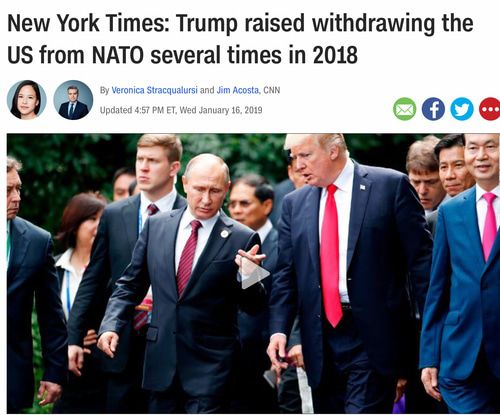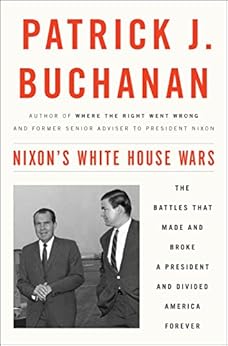
Patrick J. Buchanan: At Age 70, Time To Rethink NATO
01/17/2019
"Treaties are like roses and young girls. They last while they last."
So said President Charles De Gaulle, who in 1966 ordered NATO to vacate its Paris headquarters and get out of France.
NATO this year celebrates a major birthday. The young girl of 1966 is no longer young. The alliance is 70 years old.
And under this aging NATO today, the U.S. is committed to treat an attack on any one of 28 nations from Estonia to Montenegro to Romania to Albania as an attack on the United States.
The time is ripe for a strategic review of these war guarantees to fight a nuclear-armed Russia in defense of countries across the length of Europe that few could find on a map.
Apparently, President Donald Trump, on trips to Europe, raised questions as to whether these war guarantees comport with vital U.S. interests and whether they could pass a rigorous cost-benefit analysis.
The shock of our establishment that Trump even raised this issue in front of Europeans suggests that the establishment, frozen in the realities of yesterday, ought to be made to justify these sweeping war guarantees.
Celebrated as "the most successful alliance in history," NATO has had two histories. Some of us can yet recall its beginnings.
In 1948, Soviet troops, occupying eastern Germany all the way to the Elbe and surrounding Berlin, imposed a blockade on the city.
The regime in Prague was overthrown in a Communist coup. Foreign minister Jan Masaryk fell, or was thrown, from a third-story window to his death. In 1949, Stalin exploded an atomic bomb.
As the U.S. Army had gone home after V-E Day, the U.S. formed a new alliance to protect the crucial European powers — West Germany, France, Britain, Italy. Twelve nations agreed that an attack on one would be treated as an attack on them all.
Cross the Elbe and you are at war with us, including the U.S. with its nuclear arsenal, Stalin was, in effect, told. Hundreds of thousands of U.S. troops returned to Europe to send the message that America was serious.
Crucial to the alliance was the Yalta line dividing Europe agreed to by Stalin, FDR and Churchill at the 1945 Crimean summit on the Black Sea.
U.S. presidents, even when monstrous outrages were committed in Soviet-occupied Europe, did not cross this line into the Soviet sphere.
Truman did not send armored units up the highway to Berlin. He launched an airlift to break the Berlin blockade. Ike did not intervene to save the Hungarian rebels in 1956. JFK confined his rage at the building of the Berlin Wall to the rhetorical: "Ich bin ein Berliner."
LBJ did nothing to help the Czechs when, before the Democratic convention in 1968, Leonid Brezhnev sent Warsaw Pact tank armies to crush the Prague Spring.
When the Solidarity movement of Lech Walesa was crushed in Gdansk, Reagan sent copy and printing machines. At the Berlin Wall in 1988, he called on Mikhail Gorbachev to "tear down this wall."
Reagan never threatened to tear it down himself.
But beginning in 1989, the Wall was torn down, Germany was united, the Red Army went home, the Warsaw Pact dissolved, the USSR broke apart into 15 nations, and Leninism expired in its birthplace.
As the threat that had led to NATO disappeared, many argued that the alliance created to deal with that threat should be allowed to fade away, and a free and prosperous Europe should now provide for its own defense.
It was not to be. The architect of Cold War containment, Dr. George Kennan, warned that moving NATO into Eastern Europe and former Soviet republics would prove a "fateful error."
This, said Kennan, would "inflame the nationalistic and militaristic tendencies in Russian opinion" and "restore the atmosphere of the cold war in East-West relations." Kennan was proven right.
America is now burdened with the duty to defend Europe from the Atlantic to the Baltic, even as we face a far greater threat in China, with an economy and population 10 times that of Russia.
And we must do this with a defense budget that is not half the share of the federal budget or the GDP that Eisenhower and Kennedy had.
Trump is president today because the American people concluded that our foreign policy elite, with their endless interventions where no vital U.S. interest was imperiled, had bled and virtually bankrupted us, while kicking away all of the fruits of our Cold War victory.
Halfway into Trump’s term, the question is whether he is going to just talk about halting Cold War II with Russia, about demanding that Europe pay for its own defense, and about bringing the troops home — or whether he is going to act upon his convictions.
Our foreign policy establishment is determined to prevent Trump from carrying out his mandate. And if he means to carry out his agenda, he had best get on with it.
COPYRIGHT 2018 CREATORS.COM

Patrick J. Buchanan needs no introduction to VDARE.com readers; his books State of Emergency: The Third World Invasion and Conquest of America, and Suicide of a Superpower: Will America Survive to 2025? are available from Amazon.com. Patrick J. Buchanan is the author of “The Greatest Comeback: How Richard Nixon Rose From Defeat to Create the New Majority.
His latest book, published May 9, is “Nixon’s White House Wars: The Battles That Made and Broke a President and Divided America Forever.”
See Peter Brimelow’s review: “Wheel And Fight” — Pat Buchanan’s Nixon Book Provides Road Map For Trump.
